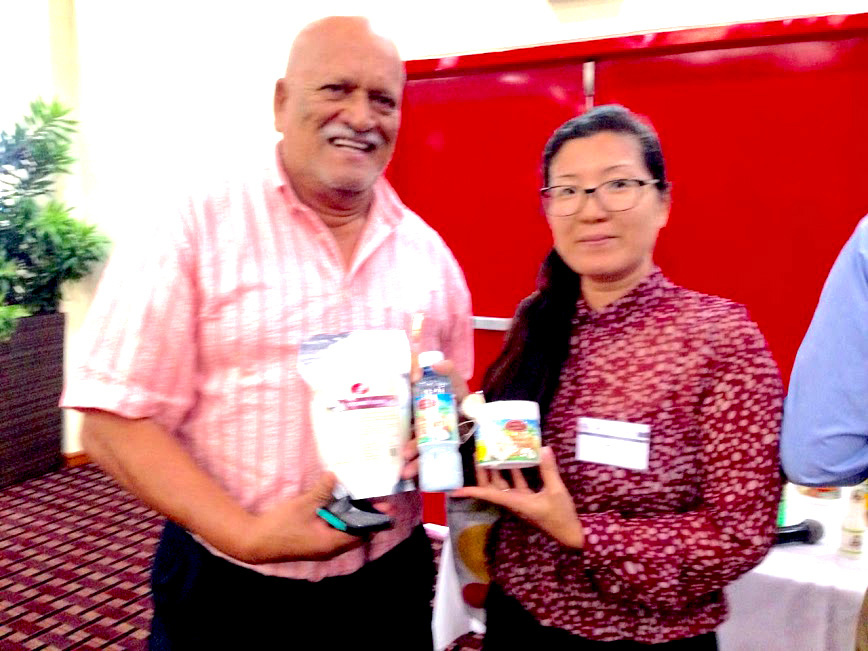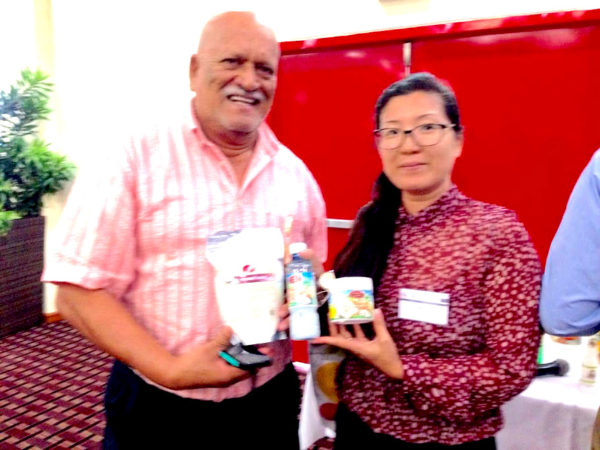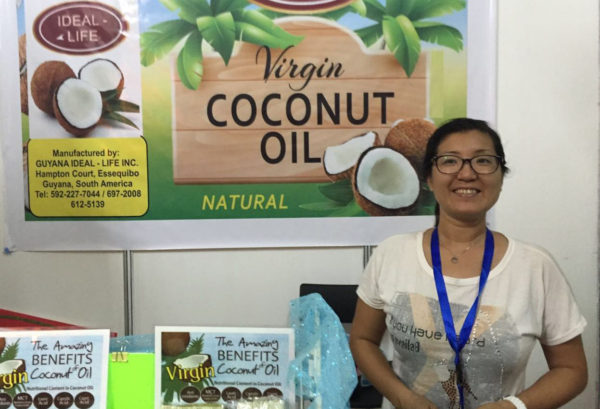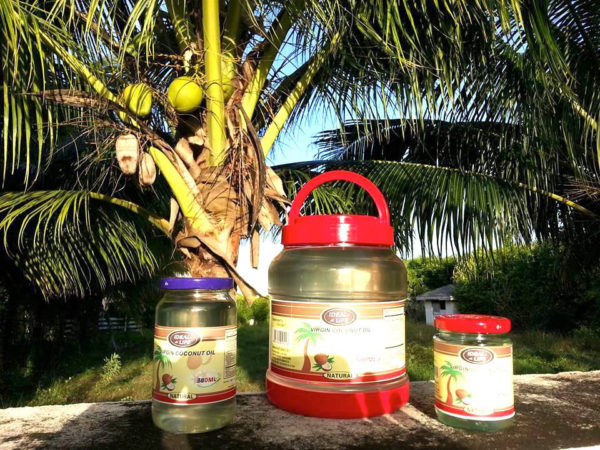Three years ago Essequibo businessman, Beni Sankar made a switch from rice to coconut production as he is optimistic that the industry will boom.
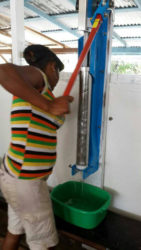
Together with his partner, May Cheung, he is working on meeting international standards and has already secured a London customer, who has visited his company.
He is currently producing cold press virgin coconut oil under the name, Guyana Ideal Oil Inc. (GILI) – a subsidiary of Kayman Sankar & Co. Ltd, which was incorporated in 1975 – and hopes to fill one 20 ft. container every month with 4,500 gallons. In that event, the amount of coconut he is purchasing weekly from the local farmers around the coast would not be sufficient.
He is happy to give farmers an opportunity to sell their coconuts and earn a dollar. He plans to add value by giving the farmers an extra dollar for the coconuts and said, “People are now getting to know the benefits of coconut.”
The only hindrance in the industry is the availability of new varieties. Presently he gets half the amount of meat (copra) than producers from the European Union and other places.
To ensure a steady supply, he will invest in a 350-acre plantation, which would help him and his partner to obtain organic certification. So far there has not been a shortage but he can anticipate one if more coconut trees are not planted. He is expected to reap 12,000 coconuts per acre and 100 coconuts per year from one thrush and has also projected the amount of meat he can gain from one coconut.
Currently he is producing 10 gallons of oil per day with 400 coconuts and can use up to about 12,000 a month. To produce the cold-pressed oil, the coconut is first grated and the moisture is removed from the meat after it is placed into a cylindrical device with holes. It is then pressed out and stored for about seven days to mature and filtering has to be done.
In his book, The Coconut Oil Miracle, Bruce Fifi said that, “Unlike other fats, coconut oil protects against heart disease, cancer, diabetes and a host of other degenerative illnesses. It supports and strengthens the immune system, thus helping the body to ward off attack from infection and disease.”
Fifi, who is also a certified nutritionist and director of the Coconut Research Centre, mentioned that coconut oil is unique among oils in promoting weight loss and has earned the reputation of being “the world’s only low-calorie fat.”
Sankar advises persons wishing to lose weight to “add a tablespoon of the virgin coconut oil to your morning coffee; it would not change the taste but would give it a lovely aroma.”
ISO 2200 certification
Sankar is also seeking an ISO 2200 certification and is aiming for fair trade – where he has to “get very involved with the community” and have better trading conditions.
Based at Hampton Court on the Essequibo Coast, the business is also producing coconut flour, lip balm and other beauty products, which go under the abbreviated name GILI.
The products were launched at the Business Expo last year and they have had the opportunity to showcase it again at the GuyExpo this year.
Once one of the biggest rice farmers in the country, Sankar decided to make the switch to coconut production after “rice became too expensive to produce.” And with a committed partner like Cheung who he says always comes up with new ideas, he has no regrets.
He supplies most of his products to the local supermarkets and has also been exporting a small amount. Cheung told this newspaper, “People would go to the supermarkets and look for our brand.”
She said they are working to achieve a basket of about six products and are also trying to add some more products to their line. These include adding more flavours to the lip balm as well as using the coconut water to make casareep. They have also been using different sizes of bottles for the oil.
Cheung is also planning to use the coconut flour to develop cake or cookie mixes that would be packaged for convenience and made in three easy steps. A Chinese national, Cheung who has been living in Guyana for the past 12 years is coordinating with her mother and a brother back home to develop “attractive packages” for the products.
Making use of his land, Sankar has invested in scotch bonnet peppers and dried sorrel, which has also hit the local market. He has also reaped his first production of boulangers and ochro “from our Aquaponic system utilizing the water from the fish ponds on soil.”
Rice
He realizes that the rice industry has nothing much to offer despite the hard work and said that coconut production does not take a lot.
“We have to diversify a little from rice, which is expensive to produce. With coconut you cannot go wrong,” Sankar said. “I found out that the coconut is the tree of life and can be used for almost anything.”
Being the only son, he was not keen on continuing with rice after his father’s death in any case, because his [Sankar’s] son not was never interested in farming. According to him, “farming and milling are risky business” and he has found the coconut industry to be “less risky and something very important.”
He has rented his rice land as well as the two rice mills, which are said to be the largest in the country.
Cheung, who is said to be a good cook, is also producing a coconut recipe book that promotes the use of their products. This is being done together with two other coconut producers; Raymond Trotz and Donald Sinclair.
Sankar is “excited about what the government is doing about coconut; by organizing the coconut festival in October. I am amazed at the plans that they have for the event; they have fantastic ideas…”
He likes the initiative of the government and said if the business people work with them they can achieve a lot. “Let the private sector be the engine of growth… and let them provide the facility…”
Aquaculture
Five years ago, Sankar who was also involved in aviation ventured into aquaculture, under the name: Sankar’s Tilapia Farm, rearing tilapia and hassar. He exports a small amount because “the fish is in demand in the local market.”
He noted that, “the fish in the sea is dwindling because I noticed that the processing plants are working to half their capacity.” He is planning to tap into that area and start processing as well.
He does not let anything go to waste and makes the coconut flour from the remains of the coconuts he squeezes out to get the oil.
He also puts together his own fish feed using 80 to 100 pounds of “cus-cus” [squeezed out coconut] to feed 800 pounds of fish per day.
Sankar supplies live tilapia, weighing one and a half pounds each, to New Thriving Restaurant in Georgetown and said, “I bring them out in plastic bags with water and oxygen and earn premium prices.”
The water from the fish pond is used in the pepper and sorrel farm, which thrives on organic fertilizer.
His fish farm stretches to 25 acres and has about 300,000 fish. Four years ago he also brought seven baby arapaimas from Brazil to be in the tilapia ponds as predators. Each arapaima has now grown to about six and a half feet long.
“The tilapia were very prolific in breeding and I did not want overcrowding in the ponds. But instead of eating the young ones, the arapaimas started eating the big ones and we had to remove them and place them in a special pond,” he related.
Sankar is also looking at introducing game fishing, where there would be fishing competitions and cooking of whatever fish is caught at the event.
He rears about 400 goats but they are not exactly for the market, rather, he prepares dishes and serves them to guests while entertaining them on his farm.
